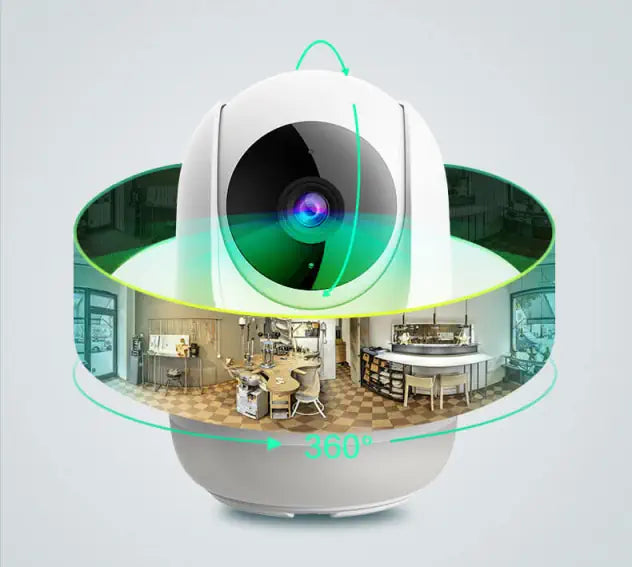In an increasingly digital world, the concept of home security has evolved significantly. Traditional locks and alarms have been augmented by sophisticated smart home technologies that offer enhanced protection, convenience, and peace of mind. From surveillance cameras to AI-powered systems, Botslab 360 smart home security solutions are revolutionizing how we safeguard our homes. This blog explores the myriad benefits, features, considerations, and best practices associated with smart home security.
Introduction to Smart Home Security
Smart home security systems integrate various interconnected devices and technologies to monitor, control, and secure your home remotely. These systems leverage the power of the internet and wireless communication to provide real-time alerts and access to surveillance footage, all managed conveniently through mobile apps or web interfaces.
Key Components of Smart Home Security Systems
-
Surveillance Cameras: High-definition cameras equipped with motion sensors and night vision capabilities provide continuous monitoring of your home's interior and exterior. They offer live streaming and recording options accessible from your smartphone.
-
Motion Sensors: These devices detect movement within specific areas and can trigger alerts or activate cameras and alarms. They are crucial for detecting intrusions or unusual activity.
-
Smart Door Locks: Allow remote locking and unlocking of doors via a smartphone app. Some models also offer keyless entry via PIN codes or biometric scans, enhancing convenience without compromising security.
-
Door and Window Sensors: These sensors detect when doors or windows are opened or tampered with, triggering alerts to notify homeowners of potential breaches.
-
Smart Alarms: Audible alarms and notifications are activated in response to unauthorized entry attempts or other security breaches, alerting both homeowners and security monitoring services.
-
Integration with Smart Devices: Smart security systems can integrate with other devices such as lights, thermostats, and voice assistants. This integration allows for automated responses based on security events, such as turning on lights when motion is detected.
-
Artificial Intelligence (AI) and Machine Learning: Advanced systems utilize AI algorithms to analyze data from sensors and cameras, distinguishing between normal activities and potential threats. This capability reduces false alarms and enhances overall system efficiency.
Benefits of Smart Home Security Systems
-
Remote Monitoring and Control: Monitor your home in real-time and control security devices remotely using a smartphone app from anywhere in the world.
-
Enhanced Protection: Comprehensive coverage with multiple layers of security deters intruders and ensures quick response to emergencies.
-
Convenience: Keyless entry, automated routines, and integration with other smart devices simplify daily routines and enhance overall convenience.
-
Customization: Tailor security settings and alerts to suit your preferences, ensuring personalized protection for your home and family.
-
Energy Efficiency: Integration with smart thermostats and lights can optimize energy usage based on occupancy and security status, leading to potential energy savings.
Considerations When Choosing a Smart Home Security System
-
Installation Requirements: Consider whether the system requires professional installation or if it can be easily set up as a DIY project.
-
Scalability: Choose a system that can expand as your needs grow, accommodating additional devices or features in the future.
-
Reliability and Connectivity: Ensure the system operates reliably and maintains a stable connection to the internet and mobile networks for seamless operation.
-
Compatibility: Check compatibility with existing smart home devices and platforms to ensure smooth integration and functionality.
-
Data Security: Protect personal data and ensure the system employs robust encryption and security measures to prevent unauthorized access.
-
Cost: Evaluate initial costs, ongoing subscription fees (if any), and potential savings versus traditional security systems or services.
Best Practices for Smart Home Security
-
Regular Updates and Maintenance: Keep firmware and software updated to protect against vulnerabilities and ensure optimal performance.
-
Strong Passwords and Authentication: Use complex passwords and enable two-factor authentication to secure access to your smart home devices and accounts.
-
Privacy Settings: Review and configure privacy settings to limit data sharing and ensure only necessary information is collected and stored.
-
Backup and Recovery: Implement backup procedures for critical data and settings to restore functionality in case of system failures or data loss.
-
User Education: Educate household members on how to use and manage the smart home security system effectively, including emergency procedures.
Future Trends in Smart Home Security
-
Integration with AI and IoT: Continued advancements in AI and IoT will enable more intelligent and proactive security solutions, capable of predicting and preventing security threats.
-
Enhanced Automation: Automation will play a larger role in managing security events, from automated responses to integrating with smart city initiatives for enhanced community safety.
-
Environmental Sensors: Integration of environmental sensors (e.g., smoke detectors, CO detectors) into smart home security systems for comprehensive home protection.
-
Privacy Enhancements: Innovations in privacy protection technologies to address concerns over data security and personal privacy in smart home environments.
Conclusion
Smart home security systems by Botslab 360offer a robust and versatile solution for modern homeowners looking to enhance the safety and protection of their properties. By leveraging advanced technologies such as AI, IoT, and remote connectivity, these systems provide not only security but also convenience and peace of mind. When choosing a smart home security system, consider your specific needs, budget, and desired features to find the solution that best fits your home and lifestyle.
Whether you're upgrading from a traditional security system or implementing security measures for the first time, investing in a smart home security system can be a wise decision that enhances both security and everyday living. Stay informed, stay secure, and enjoy the benefits of a smarter, safer home environment.
